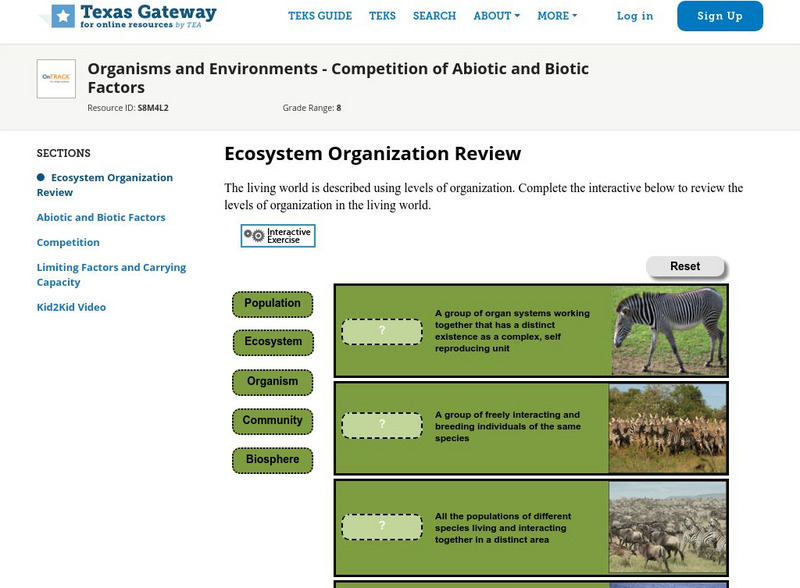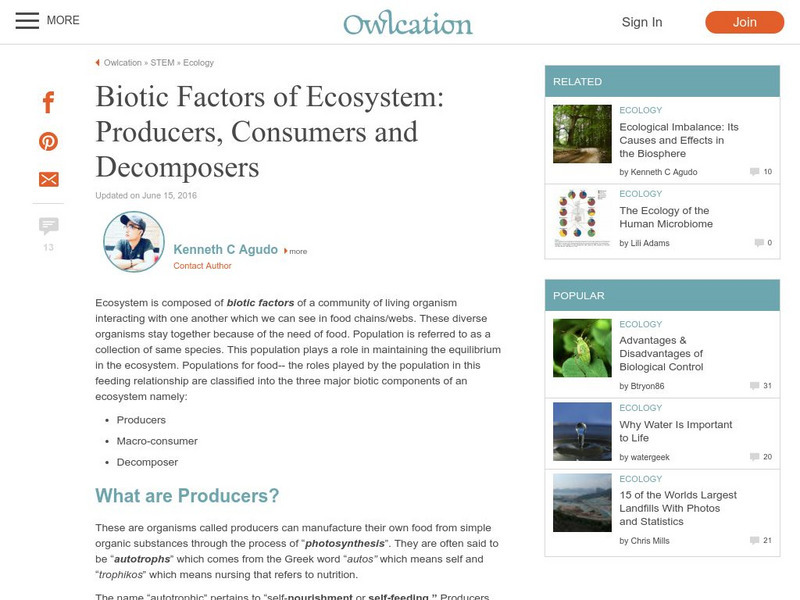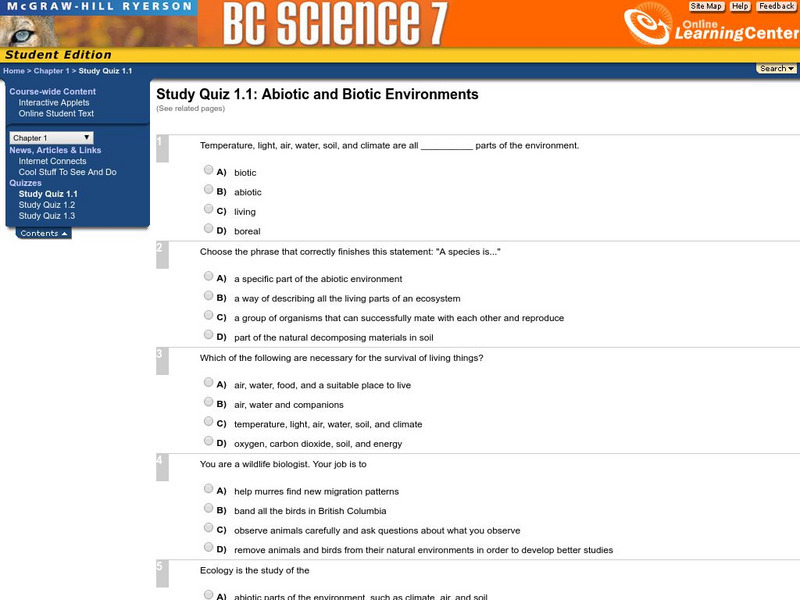Hi, what do you want to do?
Curated OER
Field Experiments on Succession
Student develop a hypothesis regarding the effects of either mowing or fertilizer upon the diversity of plant species in a grassland ecosystem. They set up experiment field plots and measure species richness.
Curated OER
Succession and Microclimate
Students compare the population of insects in different microclimates. In this biology lesson, students collect data using probes to tabulate temperature and soil data. They predict how certain parameters change as an area goes...
Curated OER
The Food Web
Learners explore the role that the Arctic hare plays in the Canadian Arctic food web.
Curated OER
The Portable Niche
Third graders, in groups, research animals, plants, and conditions found in ecosystems.
Curated OER
How Do You Do?
Seventh graders research organisms in the Merritt Island National Wildlife Refuge. They create a picture book demonstrating their understanding of relationships.
Curated OER
Survivor
Seventh graders investigate changes in the ecosystem within the school year. They see that ecosystems, communities, populations, and organisms are dynamic and change over time. They, in groups, collect data in quadrants in the fall,...
Curated OER
Understanding Ecosystems: Erosion and Flooding
Students study the balance in the environment needed for ecosystems. They discuss what can lead to erosion and flooding.
Curated OER
What's That? Diversity Among Organisms
Seventh graders can go outside and explore the organisms that live in the environment outside their door. This is a wonderful opportunity for students to examine the world around them with a new perspective. This activity will increase...
Curated OER
Earthworm Movement and Landscape Structure
Students describe differences in animal usage of habitats depending upon successional status of site. They also design other experiments to test movement patterns of animals through habitats of differing structure.
Curated OER
Make Sense of Nature
Students participate in this program that heightens their awareness and curiosity of nature as well as their sense of adventure and exploring new surroundings. They identify and choose an object from nature after exploring it with other...
Curated OER
Science Word Search
In this literacy activity, students find the words that are related to the concepts that are the theme of the word search. New vocabulary is the focus of the puzzle.
Oswego City School District
Regents Exam Prep Center: Biotic vs. Abiotic
This NY Regents prep site provides a nice overview of what abiotic and biotic factors of an ecosystem are, as well as a brief description of carrying capacity.
Texas Education Agency
Texas Gateway: Competition of Abiotic and Biotic Factors
This tutorial explores abiotic and biotic factors with videos and interactive activities.
Texas Education Agency
Texas Gateway: Abiotic and Biotic Factors in an Ecosystem
Do you know the difference between abiotic and biotic factors? This tutorial explores both these factors and their importance in the ecosystem.
Sophia Learning
Sophia: Abiotic and Biotic Factors: Lesson 2
This lesson will introduce abiotic and biotic factors, giving examples and comparing/contrasting the two. It is 2 of 4 in the series titled "Abiotic and Biotic Factors."
National Geographic
National Geographic: Ocean Abiotic Factors
After looking at examples of biotic and abiotic factors in ecosystems, students focus on abiotic factors in marine ecosystems, the physical processes that are involved, and the impact human activities can have on these. Includes handouts...
Utah Education Network
Uen: Lesson Plan: Biotic and Abiotic Factors
This site provides a detailed lesson plan to help students grasp the concepts of biotic and abiotic. Background information is provided for the teacher and plans are given for two days.
Sophia Learning
Sophia: Abiotic and Biotic Factors: Lesson 4
This lesson will introduce abiotic and biotic factors, giving examples and comparing/contrasting the two. It is 4 of 4 in the series titled "Abiotic and Biotic Factors."
Sophia Learning
Sophia: Abiotic and Biotic Factors: Lesson 1
This lesson will introduce abiotic and biotic factors, giving examples and comparing/contrasting the two. It is 1 of 4 in the series titled "Abiotic and Biotic Factors."
That Quiz
That Quiz: Biotic or Abiotic? Living or Non Living?
This fun quiz has you choose between different images to decide whether it is biotic or abiotic. It also gives examples through illustrations of abiotic and biotic things.
Other
Hub Pages: Biotic Factors of Ecosystem: Producers, Consumers and Decomposers
An ecosystem is composed of biotic factors of a community of living organisms interacting with one another which we can see in food chains/webs. These diverse organisms stay together because of the need of food. Population is referred to...
Other
University of the Western Cape: Department of Biodiversity: Abiotic Components
The Department of Biodiversity at UWC presents the impact different abiotic components on plants and animals. Some factors are light, temperature, and wind.
McGraw Hill
Mc Graw Hill Ryerson: Abiotic and Biotic Environments
Take this ten question quiz on abiotic and biotic environments. The quiz is multiple choice.
Encyclopedia of Earth
Encyclopedia of Earth: Ecology: Abiotic Factor
Explains what an abiotic factor is, and discusses each of six types and their roles in ecosystems and habitats. (Published: July 31, 2010)
Other popular searches
- Abiotic and Biotic Factors
- Abiotic and Biotic
- Biotic Communities
- Abiotic Biotic
- Biotic Conditions
- Biotic Study
- Abiotic Biotic Environment
- Abiotic and Biotic Elements
- Abiotic and Biotic Resources
- Abiotic Biotic Factors
- Abiotic Biotic Lab
- List of Biotic Factors




























